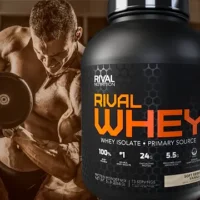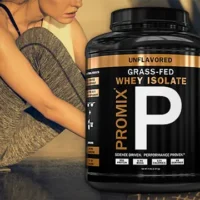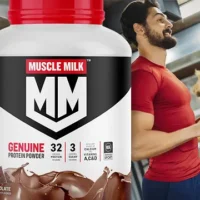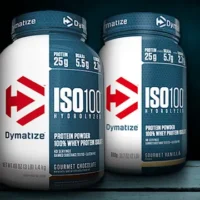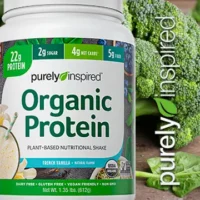BACK
Protein Boosting
Maximize your gains! Learn how to boost protein absorption naturally and unlock the full potential of protein powder to fuel your fitness goals.
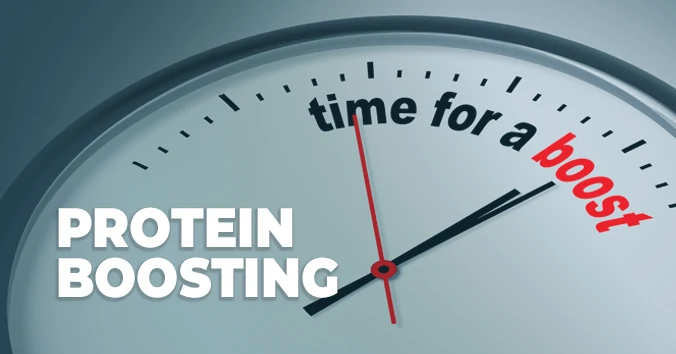
Protein is one of the most important macronutrients for optimal health and fitness. It is essential for building and repairing tissues, maintaining muscle mass, and supporting a healthy immune system. For individuals who are physically active or trying to build muscle, protein intake becomes even more critical. However, simply consuming protein is not enough - the body must also be able to absorb and utilize it effectively.
Muscle protein synthesis is the process by which the body creates new muscle protein. To maximize muscle protein synthesis, the body needs a sufficient amount of protein as well as other factors such as physical activity and rest. However, protein absorption is also crucial. If the body cannot absorb the protein properly, it will not be able to use it effectively.
There are several factors that can limit protein powder absorption, including the type of protein used, the amount consumed, and individual differences in digestive function (1). In this article, we will explore ways to boost protein absorption through natural means. By incorporating these methods into your protein routine, you can maximize the benefits of protein intake for your health and fitness goals.
Muscle protein synthesis is the process by which the body creates new muscle protein. To maximize muscle protein synthesis, the body needs a sufficient amount of protein as well as other factors such as physical activity and rest. However, protein absorption is also crucial. If the body cannot absorb the protein properly, it will not be able to use it effectively.
There are several factors that can limit protein powder absorption, including the type of protein used, the amount consumed, and individual differences in digestive function (1). In this article, we will explore ways to boost protein absorption through natural means. By incorporating these methods into your protein routine, you can maximize the benefits of protein intake for your health and fitness goals.
ENZYMES
Protein supplements are popular among athletes, bodybuilders, and fitness enthusiasts for muscle recovery and growth. However, the benefits of protein powder are limited by its absorption rate. Digestive enzymes are commonly used to increase protein absorption and availability in the body. These enzymes break down proteins into smaller peptides and amino acids, making them easier to absorb.
Commonly used enzymes added to protein powders include protease, papain, and bromelain. Protease is a general term used to describe enzymes that break down protein. Papain and bromelain are derived from papaya and pineapple, respectively, and are known for their ability to break down protein.
In addition to enzyme supplements, natural sources of digestive enzymes can also be used to boost protein absorption. Pineapple juice with bromelain, papaya, kiwi, and ginger are all examples of natural sources of digestive enzymes that can be consumed alongside protein powder.
Studies have shown that digestive enzyme supplementation can improve protein absorption and utilization, leading to increased muscle protein synthesis and muscle growth (2). In addition, athletes who supplemented with digestive enzymes experienced reduced muscle soreness and fatigue after exercise (3).
While the use of digestive enzymes is generally safe, it is important to note that individuals with digestive disorders or allergies should consult with a healthcare professional before supplementing with them.
Commonly used enzymes added to protein powders include protease, papain, and bromelain. Protease is a general term used to describe enzymes that break down protein. Papain and bromelain are derived from papaya and pineapple, respectively, and are known for their ability to break down protein.
In addition to enzyme supplements, natural sources of digestive enzymes can also be used to boost protein absorption. Pineapple juice with bromelain, papaya, kiwi, and ginger are all examples of natural sources of digestive enzymes that can be consumed alongside protein powder.
Studies have shown that digestive enzyme supplementation can improve protein absorption and utilization, leading to increased muscle protein synthesis and muscle growth (2). In addition, athletes who supplemented with digestive enzymes experienced reduced muscle soreness and fatigue after exercise (3).
While the use of digestive enzymes is generally safe, it is important to note that individuals with digestive disorders or allergies should consult with a healthcare professional before supplementing with them.
MIXING SUGGESTION
Why not blend some frozen pineapple or papaya into your shake for a refreshing enzyme boost?
Why not blend some frozen pineapple or papaya into your shake for a refreshing enzyme boost?
PRE & PROBIOTICS
Probiotics and prebiotics are another way to enhance protein absorption. Probiotics are live bacteria that help to maintain a healthy balance of microorganisms in the gut, while prebiotics are a type of dietary fiber that nourishes the beneficial bacteria in the gut.
Commonly used probiotics and prebiotics added to protein powders include lactobacillus acidophilus, bifidobacterium bifidum, and inulin. These additives can help to improve gut health, which in turn can increase the absorption of nutrients, including protein.
In addition to protein powders, natural sources of probiotics and prebiotics can be added to the diet. Fermented foods, such as yogurt, kefir, kimchi, and sauerkraut, are rich in probiotics and can be consumed as a snack or added to meals. Other sources of prebiotics include chicory root, onions, garlic, asparagus, and bananas.
Research has shown that incorporating probiotics and prebiotics into the diet can have a positive impact on protein absorption. A study published in the International Journal of Food Sciences and Nutrition found that probiotics and prebiotics improved protein digestion and absorption in healthy adults (4).
Overall, incorporating probiotics and prebiotics into a protein powder routine can enhance gut health and improve protein absorption, leading to better overall health and fitness.
Commonly used probiotics and prebiotics added to protein powders include lactobacillus acidophilus, bifidobacterium bifidum, and inulin. These additives can help to improve gut health, which in turn can increase the absorption of nutrients, including protein.
In addition to protein powders, natural sources of probiotics and prebiotics can be added to the diet. Fermented foods, such as yogurt, kefir, kimchi, and sauerkraut, are rich in probiotics and can be consumed as a snack or added to meals. Other sources of prebiotics include chicory root, onions, garlic, asparagus, and bananas.
Research has shown that incorporating probiotics and prebiotics into the diet can have a positive impact on protein absorption. A study published in the International Journal of Food Sciences and Nutrition found that probiotics and prebiotics improved protein digestion and absorption in healthy adults (4).
Overall, incorporating probiotics and prebiotics into a protein powder routine can enhance gut health and improve protein absorption, leading to better overall health and fitness.
MIXING SUGGESTION
Try adding some Greek Yogurt to your shake as an excellent source of probiotics!
Try adding some Greek Yogurt to your shake as an excellent source of probiotics!
HEALTHY FATS
In addition to enzymes, probiotics, and prebiotics, healthy fats can also aid in protein absorption. Consuming healthy fats with protein powder can slow down the digestion process and prolong the release of amino acids into the bloodstream, which can lead to increased muscle protein synthesis (MPS) and muscle growth (5).
Examples of healthy fats that can be added to protein powder include avocado, nuts, seeds, and olive oil. These healthy fats also provide additional nutritional benefits, such as vitamins, minerals, and antioxidants (6).
Studies have shown that consuming healthy fats with protein can enhance muscle protein synthesis and muscle recovery. One study found that adding 37 grams of fat to a whey protein shake significantly increased MPS compared to consuming the shake without fat (7). Another study found that consuming protein with added omega-3 fatty acids improved muscle protein synthesis in older adults (8).
Furthermore, consuming healthy fats with protein can help with satiety and weight management. The combination of protein and healthy fats can help to keep you feeling full and satisfied for longer, which can lead to a decrease in overall calorie intake (9).
Incorporating healthy fats into your protein powder routine is simple. You can add a tablespoon of nut butter or a handful of nuts to your protein shake, drizzle some olive oil on your salad with protein, or mix in some avocado with your protein smoothie.
Examples of healthy fats that can be added to protein powder include avocado, nuts, seeds, and olive oil. These healthy fats also provide additional nutritional benefits, such as vitamins, minerals, and antioxidants (6).
Studies have shown that consuming healthy fats with protein can enhance muscle protein synthesis and muscle recovery. One study found that adding 37 grams of fat to a whey protein shake significantly increased MPS compared to consuming the shake without fat (7). Another study found that consuming protein with added omega-3 fatty acids improved muscle protein synthesis in older adults (8).
Furthermore, consuming healthy fats with protein can help with satiety and weight management. The combination of protein and healthy fats can help to keep you feeling full and satisfied for longer, which can lead to a decrease in overall calorie intake (9).
Incorporating healthy fats into your protein powder routine is simple. You can add a tablespoon of nut butter or a handful of nuts to your protein shake, drizzle some olive oil on your salad with protein, or mix in some avocado with your protein smoothie.
MIXING SUGGESTION
Add nut butter, such as almond or peanut, as a tasty way to include healthy fats in your protein shake.
Add nut butter, such as almond or peanut, as a tasty way to include healthy fats in your protein shake.
MAXIMIZE RESULTS
Optimal protein intake and absorption are crucial for maintaining and building muscle mass, as well as promoting overall health and fitness. So get the most out of your protein powder with our protein-boosting tips.
Incorporating these protein-boosting methods are a great way to add to your protein powder routine to help maximize protein absorption to support muscle growth and repair, and improve overall health and fitness. By being mindful of protein absorption and incorporating strategies to enhance it, you can better achieve your fitness and health goals!
Incorporating these protein-boosting methods are a great way to add to your protein powder routine to help maximize protein absorption to support muscle growth and repair, and improve overall health and fitness. By being mindful of protein absorption and incorporating strategies to enhance it, you can better achieve your fitness and health goals!
References
- Phillips SM, Van Loon LJ. Dietary protein for athletes: from requirements to optimum adaptation. J Sports Sci. 2011;29 Suppl 1:S29-S38. doi:10.1080/02640414.2011.619204.
- Kerksick, C. M., Wilborn, C. D., Roberts, M. D., Smith-Ryan, A., Kleiner, S. M., Jäger, R., ... & Kreider, R. B. (2018). ISSN exercise & sports nutrition review update: research & recommendations. Journal of the International Society of Sports Nutrition, 15(1), 1-57.
- Miller, P. C., Bailey, S. P., Barnes, M. E., Derr, S. J., & Hall, E. E. (2004). The effects of protease supplementation on skeletal muscle function and DOMS following downhill running. Journal of sports sciences, 22(4), 365-372.
- Ouwehand AC, Tiihonen K, Saarinen M, Putaala H, Rautonen N. Influence of a combination of Lactobacillus acidophilus NCFM and lactitol on healthy elderly: intestinal and immune parameters. Br J Nutr. 2009 Mar;101(6):367-75. doi: 10.1017/S0007114508020320. Epub 2008 Jul 8. PMID: 18611277.
- Pasiakos SM, Cao JJ, Margolis LM, Sauter ER, Whigham LD, McClung JP, Rood JC, Carbone JW, Combs GF Jr, Young AJ. Effects of high-protein diets on fat-free mass and muscle protein synthesis following weight loss: a randomized controlled trial. FASEB journal. 2013 Jun;27(6): 3837-47.
- Schwingshackl L, Hoffmann G. Monounsaturated fatty acids and risk of cardiovascular disease: synopsis of the evidence available from systematic reviews and meta-analyses. Nutrients. 2012 Nov;4(12):1989-2007.
- Churchward-Venne TA, Holwerda AM, Phillips SM, van Loon LJ. What is the optimal amount of protein to support post-exercise skeletal muscle reconditioning in the older adult?. Sports Medicine. 2016 Jan 1;46(9):1205-12.
- Smith GI, Atherton P, Reeds DN, Mohammed BS, Rankin D, Rennie MJ, Mittendorfer B. Dietary omega-3 fatty acid supplementation increases the rate of muscle protein synthesis in older adults: a randomized controlled trial. American Journal of Clinical Nutrition. 2011 Feb 1;93(2):402-12.
- Paddon-Jones D, Westman E, Mattes RD, Wolfe RR, Astrup A, Westerterp-Plantenga M. Protein, weight management, and satiety. The American Journal of Clinical Nutrition. 2008 May 1;87(5):1558S-61S.
Popular Reviews
The content on this site has not been written, reviewed or endorsed by a medical professional. We assume no liability for the misuse of supplements and recommend you review the label of any product, as well as consulting with your health care professional.
We are a participant in the Amazon Services LLC Associates Program, an affiliate advertising program designed to provide a means for us to earn fees by linking to Amazon.com and affiliated sites.
We are a participant in the Amazon Services LLC Associates Program, an affiliate advertising program designed to provide a means for us to earn fees by linking to Amazon.com and affiliated sites.
© 2025 ProteinPowder.com
Quick Disclosure:
If you make a purchase through our links, we may snag a small commission at no extra cost to you. We like to think of it as a high-five for guiding you to awesome products that fuel your fitness goals!
If you make a purchase through our links, we may snag a small commission at no extra cost to you. We like to think of it as a high-five for guiding you to awesome products that fuel your fitness goals!
